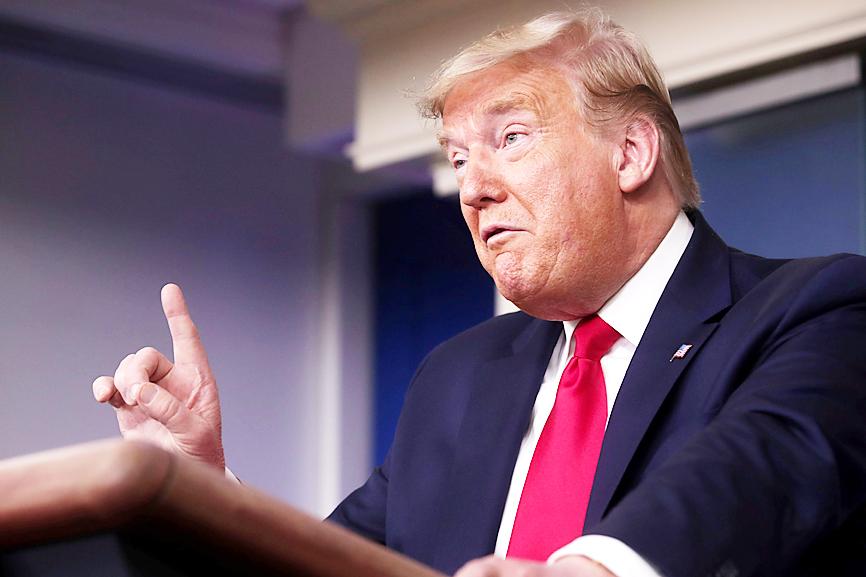US President Donald Trump on Thursday signed the Taiwan Allies International Protection and Enhancement Initiative (TAIPEI) Act of 2019 into law, before he talked with Chinese President Xi Jinping (習近平) by telephone about the COVID-19 pandemic.
The TAIPEI Act authorizes the US government to increase economic, diplomatic and security engagements with nations upgrading relations with Taiwan, or reduce such engagements with nations taking actions that seriously undermine Taiwan.
The act calls on Washington to advocate for Taiwan’s membership, or observer status, in international organizations, while encouraging the US trade representative to further strengthen trade and economic relations with Taiwan.

Photo: Reuters
It is the second piece of legislation directly related to Taiwan that Trump has signed.
On March 16, 2018, he signed the Taiwan Travel Act, which encourages visits between US and Taiwanese officials of all levels, and signals an upgrade of bilateral ties, following the US’ Taiwan Relations Act of 1979.
The latest bill, first introduced by US Senator Cory Gardner in May last year, was passed by the US Senate on March 11.
US Representative John Curtis introduced the bill in the House of Representatives, which unanimously passed it on March 4.
The US is one of Taiwan’s most important international collaborators, President Tsai Ing-wen (蔡英文) wrote on Facebook yesterday, thanking Trump for taking concrete action to expand relations with Taiwan and support its participation in the global community.
She also thanked Gardner for introducing the bill in the US Senate and Curtis in the US House of Representatives.
The TAIPEI Act is “a testament to #Taiwan-#US friendship & mutual support as we work together to address global threats to human health & our shared democratic values,” Tsai wrote on Twitter.
Presidential Office spokesman Alex Huang (黃重諺) said in a statement that the US is Taiwan’s most important international partner.
Taiwan would continue to strengthen collaboration with the US and other like-minded nations, Huang said, thanking Trump’s administration and the US Congress for their steadfast support.
Taiwan would advance partnerships around the globe based on the shared values of freedom, democracy and prosperity, he said, adding that the nation — as a force for good in the world — would continue to contribute to the global community.
Ministry of Foreign Affairs spokeswoman Joanne Ou (歐江安) said that the ministry would maintain its close ties with the US based on mutual trust and reciprocity, while working with other like-minded nations to achieve a greater global presence.

CHAOS: Iranians took to the streets playing celebratory music after reports of Khamenei’s death on Saturday, while mourners also gathered in Tehran yesterday Iranian Supreme Leader Ayatollah Ali Khamenei was killed in a major attack on Iran launched by Israel and the US, throwing the future of the Islamic republic into doubt and raising the risk of regional instability. Iranian state television and the state-run IRNA news agency announced the 86-year-old’s death early yesterday. US President Donald Trump said it gave Iranians their “greatest chance” to “take back” their country. The announcements came after a joint US and Israeli aerial bombardment that targeted Iranian military and governmental sites. Trump said the “heavy and pinpoint bombing” would continue through the week or as long

TRUST: The KMT said it respected the US’ timing and considerations, and hoped it would continue to honor its commitments to helping Taiwan bolster its defenses and deterrence US President Donald Trump is delaying a multibillion-dollar arms sale to Taiwan to ensure his visit to Beijing is successful, a New York Times report said. The weapons sales package has stalled in the US Department of State, the report said, citing US officials it did not identify. The White House has told agencies not to push forward ahead of Trump’s meeting with Chinese President Xi Jinping (習近平), it said. The two last month held a phone call to discuss trade and geopolitical flashpoints ahead of the summit. Xi raised the Taiwan issue and urged the US to handle arms sales to

BIG SPENDERS: Foreign investors bought the most Taiwan equities since 2005, signaling confidence that an AI boom would continue to benefit chipmakers Taiwan Semiconductor Manufacturing Co’s (TSMC, 台積電) market capitalization swelled to US$2 trillion for the first time following a 4.25 percent rally in its American depositary receipts (ADR) overnight, putting the world’s biggest contract chipmaker sixth on the list of the world’s biggest companies by market capitalization, just behind Amazon.com Inc. The site CompaniesMarketcap.com ranked TSMC ahead of Saudi Aramco and Meta Platforms Inc. The Taiwanese company’s ADRs on Tuesday surged to US$385.75 on the New York Stock Exchange, as strong demand for artificial intelligence (AI) applications led to chip supply constraints and boost revenue growth to record-breaking levels. Each TSMC ADR represents

Pro-democracy media tycoon Jimmy Lai’s (黎智英) fraud conviction and prison sentence were yesterday overturned by a Hong Kong court, in a surprise legal decision that comes soon after Lai was jailed for 20 years on a separate national security charge. Judges Jeremy Poon (潘兆初), Anthea Pang (彭寶琴) and Derek Pang (彭偉昌) said in the judgement that they allowed the appeal from Lai, and another defendant in the case, to proceed, as a lower court judge had “erred.” “The Court of Appeal gave them leave to appeal against their conviction, allowed their appeals, quashed the convictions and set aside the sentences,” the judges